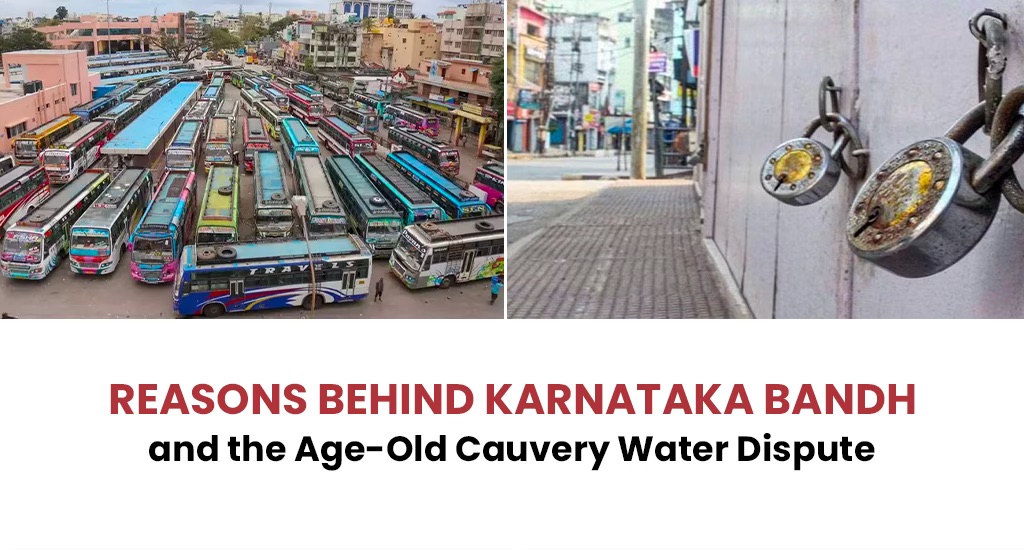A statewide bandh initiated by pro-Kannada organisations in Karnataka to demonstrate their opposition to the release of Cauvery water to Tamil Nadu is currently in progress across the state. The bandh commenced on Friday, September 29 at 6 am, with pro-Kannada activists staging protests and chanting slogans at various locations. Law enforcement authorities have apprehended over 70 individuals associated with various organisations from various regions of the state.
A total of 44 flights had to be canceled at Bengaluru International Airport due to the ongoing protests. Demonstrators arrived at the airport, creating a tense scene by shouting slogans. Subsequently, they were detained by authorities.
Protest marches have been scheduled in various regions of the state, including the state’s capital, Bengaluru. All educational institutions in Bengaluru and Mandya districts are closed, and the city has seen the enforcement of Section 144, which imposes certain restrictions.
The declaration of the Karnataka bandh Friday was issued by the ‘Kannada Okkuta,’ which is spearheaded by Kannada activist Vatal Nagaraj. The ‘Kannada Okkuta’ functions as a collective platform for various Kannada organisations, encompassing segments of Karnataka Rakshana Vedike, Kannada Chalavali (Vatal Paksha), and diverse farmers’ associations. They have jointly called for a statewide shutdown lasting from dawn to dusk.
Reasons for the Karnataka Bandh
It all started with the Cauvery Water Regulation Committee (CWRC) ordering the Karnataka government to release water at the rate of 3,000 cubic feet per second (cusecs) to Tamil Nadu for 15 days from Thursday (September 28) to October 15. During their meeting with CWRC members in New Delhi on Tuesday, Karnataka officials contended that there was a shortfall in cumulative inflows to its four reservoirs in the Cauvery basin up to September 25 due to the failure of the south-west monsoon, leading to insufficient storage in reservoirs this year. As per them, the state is facing a dire shortage of water supply and is finding it extremely difficult to cater to the drinking water requirements, let alone supplying for irrigation. Days after the water was released by Karnataka to Tamil Nadu, the ‘Kannada Okkuta’ called the bandh. All of this re-opened the age-old Cauvery dispute. Let’s know more about it.
What is the Cauvery dispute?
Flowing through the states of Karnataka and Tamil Nadu before ultimately merging into the Bay of Bengal, the Cauvery River holds considerable importance in the southern regions of India.
The conflict revolves around the division of water resources when there’s a scarcity, the apportionment of water in typical years, and the construction of reservoirs and dams along the river’s route. Both states are competing for a larger share of the river’s water to meet the demands of their growing populations and agricultural endeavours.
Over the years, the Cauvery dispute has undergone a series of agreements, disagreements, and legal battles. In 1990, the Cauvery Water Disputes Tribunal (CWDT) was established to address water conflicts involving Tamil Nadu, Karnataka, Kerala, and Puducherry.
The CWDT’s deliberations spanned 17 years, culminating in a definitive decision in 2007 that outlined how Cauvery water would be distributed among these four riverside states. During times of water scarcity, the allocation would be made on a pro-rata basis.
In February 2007, the CWDT issued its final award, specifying water allocations among the four states within the Cauvery basin, based on an annual availability of 740 TMC (Thousand Million Cubic Feet) in a typical year. Implementing this allocation, particularly the division between Karnataka and Tamil Nadu, has proven challenging, with both states expressing dissatisfaction with the tribunal’s rulings on multiple occasions.
In 2018, the Supreme Court of India designated the Cauvery River as a national resource and upheld the water-sharing arrangements established by the CWDT. Furthermore, the Central Government was directed to formalise the Cauvery Management Scheme.
The most recent dispute arose when Karnataka declined to adhere to previously agreed-upon water release volumes. Tamil Nadu requested the release of 10,000 cusecs of water over a 15-day period, whereas Karnataka proposed a lower release of 8,000 cusecs for the same duration.
Karnataka attributed its decision to inadequate inflow, primarily caused by reduced rainfall in the Cauvery catchment area, including the origin point in Kodagu. The state government pointed out that from June to August, Kodagu experienced a rainfall deficit of 44%.
In an effort to secure the desired water release, Tamil Nadu approached the Supreme Court to ensure that Karnataka releases 24,000 cubic feet per second (cusecs) of water from its reservoirs. In response, Karnataka argued before the Supreme Court that Tamil Nadu has failed to acknowledge that 2023 is a “distressed water year” rather than a “normal water year.”
Following discussions during a meeting held on Tuesday, the Cauvery Water Regulation Committee has put forth a recommendation for Karnataka to commence the release of 3000 cusecs of water at Biligundlu, starting from September 28th and extending through to October 15th.
This dispute led to fresh fights in the state of Bengaluru, a substantial protest was organised by activists from the Karnataka Rakshana Vedike (KRV) against the state’s Members of Parliament (MPs) and the Siddaramaiah Government regarding the Cauvery River water dispute. During the protest, KRV activists vociferously chanted slogans asserting “Cauvery Is Ours” to express their opposition to the release of the river water to Tamil Nadu.
In support of the Bandh, all stores, shopping centres, and other business establishments are closed. Hotels, eateries, and movie theatres are also not operational, and taxi and auto services are suspended.
But the Bengaluru Metro rail system is still in operation. The State Transport Department has instructed the state transport corporations to maintain their regular services. Banks, medical facilities, and pharmacies are open and operational, and government offices are conducting their usual business.
The airport authorities have released a passenger advisory due to the bandh, expressing their expectation of potential disruptions in transportation to and from the airport. They recommended that passengers make their travel arrangements with this in mind and stay tuned to alerts from airlines and authorities for additional information.
Such bandhs or protests lead to unnecessary interruptions for the public in general, and loss of money and amenities.








